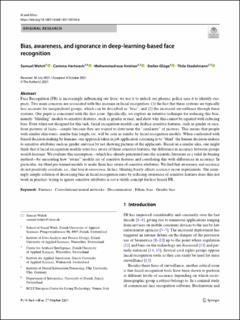Please use this identifier to cite or link to this item:
https://doi.org/10.21256/zhaw-23393| Publication type: | Article in scientific journal |
| Type of review: | Peer review (publication) |
| Title: | Bias, awareness, and ignorance in deep-learning-based face recognition |
| Authors: | Wehrli, Samuel Hertweck, Corinna Amirian, Mohammadreza Glüge, Stefan Stadelmann, Thilo |
| et. al: | No |
| DOI: | 10.1007/s43681-021-00108-6 10.21256/zhaw-23393 |
| Published in: | AI and Ethics |
| Volume(Issue): | 2 |
| Issue: | 3 |
| Page(s): | 509 |
| Pages to: | 522 |
| Issue Date: | 27-Oct-2021 |
| Publisher / Ed. Institution: | Springer |
| ISSN: | 2730-5953 2730-5961 |
| Language: | English |
| Subjects: | Fairness; Convolutional neural network; Discrimination; Ethnic bias; Gender bias |
| Subject (DDC): | 006: Special computer methods 170: Ethics |
| Abstract: | Face Recognition (FR) is increasingly influencing our lives: we use it to unlock our phones; police uses it to identify suspects. Two main concerns are associated with this increase in facial recognition: (1) the fact that these systems are typically less accurate for marginalized groups, which can be described as “bias”, and (2) the increased surveillance through these systems. Our paper is concerned with the first issue. Specifically, we explore an intuitive technique for reducing this bias, namely “blinding” models to sensitive features, such as gender or race, and show why this cannot be equated with reducing bias. Even when not designed for this task, facial recognition models can deduce sensitive features, such as gender or race, from pictures of faces—simply because they are trained to determine the “similarity” of pictures. This means that people with similar skin tones, similar hair length, etc. will be seen as similar by facial recognition models. When confronted with biased decision-making by humans, one approach taken in job application screening is to “blind” the human decision-makers to sensitive attributes such as gender and race by not showing pictures of the applicants. Based on a similar idea, one might think that if facial recognition models were less aware of these sensitive features, the difference in accuracy between groups would decrease. We evaluate this assumption—which has already penetrated into the scientific literature as a valid de-biasing method—by measuring how “aware” models are of sensitive features and correlating this with differences in accuracy. In particular, we blind pre-trained models to make them less aware of sensitive attributes. We find that awareness and accuracy do not positively correlate, i.e., that bias ≠ awareness. In fact, blinding barely affects accuracy in our experiments. The seemingly simple solution of decreasing bias in facial recognition rates by reducing awareness of sensitive features does thus not work in practice: trying to ignore sensitive attributes is not a viable concept for less biased FR. |
| URI: | https://digitalcollection.zhaw.ch/handle/11475/23393 |
| Fulltext version: | Published version |
| License (according to publishing contract): | CC BY 4.0: Attribution 4.0 International |
| Departement: | Life Sciences and Facility Management School of Engineering Social Work |
| Organisational Unit: | Centre for Artificial Intelligence (CAI) Institute of Computational Life Sciences (ICLS) Institute of Data Analysis and Process Design (IDP) |
| Published as part of the ZHAW project: | Libra: A One-Tool Solution for MLD4 Compliance |
| Appears in collections: | Publikationen Soziale Arbeit |
Files in This Item:
| File | Description | Size | Format | |
|---|---|---|---|---|
| 2021_Wehrli-etal_Deep-learning-face-recognition.pdf | 1.68 MB | Adobe PDF |  View/Open |
Show full item record
Wehrli, S., Hertweck, C., Amirian, M., Glüge, S., & Stadelmann, T. (2021). Bias, awareness, and ignorance in deep-learning-based face recognition. AI and Ethics, 2(3), 509–522. https://doi.org/10.1007/s43681-021-00108-6
Wehrli, S. et al. (2021) ‘Bias, awareness, and ignorance in deep-learning-based face recognition’, AI and Ethics, 2(3), pp. 509–522. Available at: https://doi.org/10.1007/s43681-021-00108-6.
S. Wehrli, C. Hertweck, M. Amirian, S. Glüge, and T. Stadelmann, “Bias, awareness, and ignorance in deep-learning-based face recognition,” AI and Ethics, vol. 2, no. 3, pp. 509–522, Oct. 2021, doi: 10.1007/s43681-021-00108-6.
WEHRLI, Samuel, Corinna HERTWECK, Mohammadreza AMIRIAN, Stefan GLÜGE und Thilo STADELMANN, 2021. Bias, awareness, and ignorance in deep-learning-based face recognition. AI and Ethics. 27 Oktober 2021. Bd. 2, Nr. 3, S. 509–522. DOI 10.1007/s43681-021-00108-6
Wehrli, Samuel, Corinna Hertweck, Mohammadreza Amirian, Stefan Glüge, and Thilo Stadelmann. 2021. “Bias, Awareness, and Ignorance in Deep-Learning-Based Face Recognition.” AI and Ethics 2 (3): 509–22. https://doi.org/10.1007/s43681-021-00108-6.
Wehrli, Samuel, et al. “Bias, Awareness, and Ignorance in Deep-Learning-Based Face Recognition.” AI and Ethics, vol. 2, no. 3, Oct. 2021, pp. 509–22, https://doi.org/10.1007/s43681-021-00108-6.
Items in DSpace are protected by copyright, with all rights reserved, unless otherwise indicated.